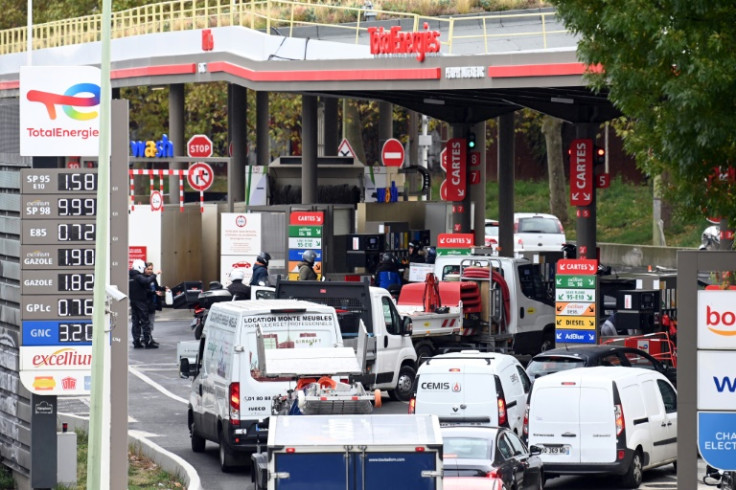France Orders More Strikers Back To Work As Fuel Shortages Bite

The French government on Thursday ordered more striking workers back to a fuel depot in northern France after talks to end a three-week strike stalled, saying petrol shortages were taking too big a toll on the economy.
Motorists scrambled again to find service stations that still had stocks, though President Emmanuel Macron said in a televised address Wednesday that relief was in sight for next week.
"The government is counting on talks resuming in the coming hours between management and labour representatives," the office of Prime Minister Elisabeth Borne said.
But in the meantime, essential workers were told to return to work Thursday at the huge TotalEnergies fuel depot near Dunkirk, northern France, where around a dozen police were stationed outside, an AFP journalist saw.
Borne's office cited a "real economic threat" for much of northern France, in particular for agriculture, fishing and industry.
The CGT and FO unions leading the refineries strike have said they will fight the requisition orders in court, calling them an illegal manoeuvre against the right to labour action.
"Police came to their homes and made them sign a paper ordering that they come work this afternoon from 2:00 pm until 6:00 am tomorrow," the FO official at the Dunkirk site, Clement Mortier, told AFP.
The government had already requisitioned depot workers to return to the Esso-ExxonMobil refinery at Gravenchon-Port-Jerome in northern France on Wednesday.
Unions are seeking pay hikes in response to steep inflation, pointing to the massive profits of energy companies as gas and oil prices have soared during Russia's invasion of Ukraine.
Their strike has left 30 percent of service stations nationwide with little or no fuel, though nearly half of stations are impacted in northern France and the greater Paris region, the energy transition ministry said.
On Thursday, TotalEnergies told AFP it would propose a six-percent raise for next year, below the CGT's demand for an immediate 10-percent hike, retroactive to January 1.
"We're not going to negotiate through the media," responded Eric Sellini, the CGT coordinator at the company.
His union also called Thursday to extend the strike throughout the energy sector, potentially disrupting operations in the country's all-important nuclear sector.
Government officials were pressing the companies to negotiate, fearing an escalation of tensions ahead of a nationwide march Sunday against inflation, organised by Macron's left-wing opponents.
Finance Minister Bruno Le Maire told RTL radio that given TotalEnergies' huge profits this year, it had "the capacity... and therefore an obligation" to raise workers' pay.
© Copyright AFP 2025. All rights reserved.




















